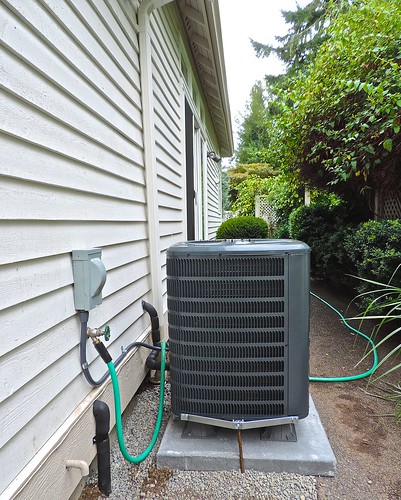In the warm and humid Florida climate, your home needs a cooling system that can maintain a comfortable indoor temperature. There are many options on the market and the most popular are central air conditioners and heat pumps. The main difference between these two is that an air conditioner creates cool air but a heat pump can reverse its cycle to produce heat.
Heat pumps are an excellent choice for Florida as they are more efficient in milder climates. They are not recommended in areas where temperatures go below freezing. If it is too cold outside, the pump must overwork to absorb heat energy and re-allocate it. Even if the weather is warm most of the year, you still need heating during the short colder period and heat pumps allow you to both cool and heat with one system. There are several different types of heat pumps.
Air-Source Heat Pumps

An air-source heat pump absorbs heat from the air. During warm weather, the heat pump extracts heat from the indoor air and expulses it outside. In cold weather, it takes heat from the outdoor air and transfers it inside. Choose from various air-source pumps to suit your specific needs.
- The split system heat pump has outside and inside units that work with coils to absorb and release heat via the evaporator and condenser in both units.
- In a packaged heat pump or ‘rooftop unit,’ the coils are situated in a single unit, often on the roof of the building. The cooled or heated air is delivered inside the building via ductwork passing through the walls or ceiling.
- The ductless pump effectuates its transfer through refrigerant lines to a fan/coil unit installed in the wall or ceiling.
Ground-Source Heat Pumps
Also called geothermal, earth-energy, or geo-exchange, these pumps draw heat from the ground or groundwater. Compared to outdoor air, the temperature of the earth is warmer in the winter and cooler in the summer. The stable temperature of our planet allows the geothermal system to be much more efficient than an air-source system.
Variable Refrigerant Flow (VRF) Heat Pumps
The variable refrigerant flow (VRF) heat pump is a newer type of heat pump technology, offering more comfort control than traditional heat pumps. VRF systems are also quieter and more energy-efficient and can heat some rooms while cooling others.
Heat pumps present many advantages. They are environmentally friendly because they don’t burn any fossil fuels to produce heat, so they respect the environment. Heat pumps extract the heat from one place and transfer it to another using mechanical energy, so they consume less energy, save on operating costs, and lower electric bills. Using only one system for both heating and cooling lowers the cost of operation as well as maintenance and repair.
If you want to ensure year-round comfort in your Florida home, a heat pump is an excellent option. It offers quality air conditioning and heating when needed, helps you save energy, and is not detrimental to the environment.
Leave a Reply